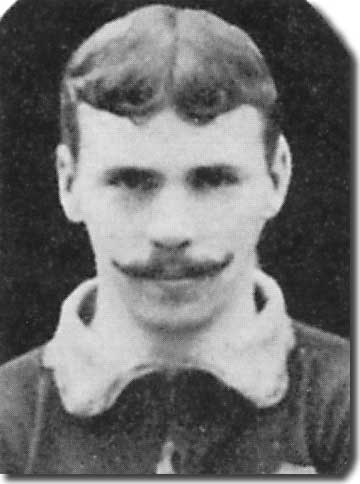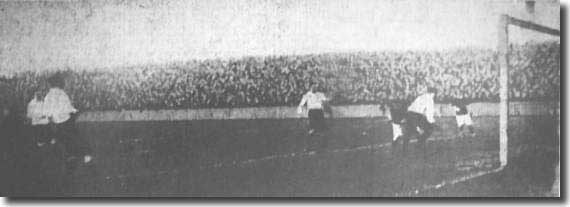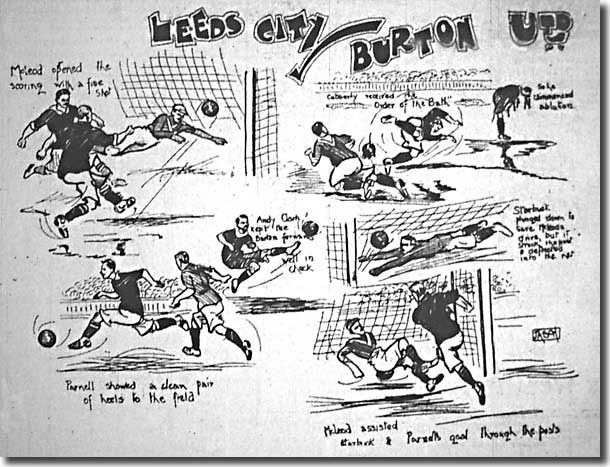 Fred
Parnell, a dashing and skilful right winger, was one of the star turns
in the Leeds City ranks as they navigated their way through the club's
first few seasons of league football. He was the first player to make
a century of league appearances for the Peacocks and one of just ten who
managed the feat over the club's fifteen-year existence.
Fred
Parnell, a dashing and skilful right winger, was one of the star turns
in the Leeds City ranks as they navigated their way through the club's
first few seasons of league football. He was the first player to make
a century of league appearances for the Peacocks and one of just ten who
managed the feat over the club's fifteen-year existence.
Habitually sporting a dapper waxed moustache and always ready to show
a defender a clear pair of heels, Parnell was one of the best wingers
in the game of the 1900s. He was elusive and fast, with the ability and
trickery to buy time and space down the flank before conjuring up an inviting
cross. Fred Hargraves, David
Wilson and Billy McLeod all had reason to be grateful for the service
he provided. His forward thrusts, usually in combination with inside-right
Bob Watson, were a feature of Leeds City's
first three seasons in league football. Secretary
manager Gilbert Gillies rarely excluded Parnell from his plans when
he was fit and available for selection.
Gresham Frederick Parnell was born in Sutton-in-Ashfield, Derbyshire,
in 1886 and began his career with local sides Skegby United and Pinxton.
The teenager was a star of the junior game and his exploits earned him
an opportunity with First Division giants Derby County. He signed for
the Rams in 1903, just after they had lost the FA Cup final to Bury
by a record six goals to nil.
Opportunities were scarce at the Baseball Ground and Parnell was limited
to nine first team appearances over the next couple of years. In 1905,
however, an opportunity for regular football at a senior level presented
itself from an unexpected quarter.
A year after their formation, Leeds City were making preparations for
life in the Football League and scouring the country for promising young
talent. Parnell was one of the first players recruited to be part of
this new era, a deal being confirmed shortly before City's
election to the Second Division in May 1905.
His signing was hailed as a triumph in the West Riding, as the Leeds
Mercury observed at the time. 'Derby County have lost a good man in
G Parnell, who lost his place alongside Bloomer through the brilliant
form shown by the young amateur, Hounsfield.'
Parnell was quickly ensconced as a City stalwart, making his debut in
the club's first League game, a 1-0
defeat at Bradford City on September 2 1905. The Mercury reported,
'Parnell was not entirely happy with Watson, his partner. Accustomed to
the go ahead methods of Bloomer, whose great aim is to make straight for
goal after receiving the ball from the wing, he was not always prepared
for a return pass, and thus often appeared at a disadvantage.' The Yorkshire
Post was more positive, noting, 'Parnell was probably the best man
in the visitors' front line.'
The wing man played a part in City's first goal in formal competition,
supplying the cross from which centre-forward Tommy
Drain slotted home against Lincoln City in a 2-2 draw on September
11.
Parnell's own first goal for Leeds came from a penalty in the return
match at Lincoln at the end of the month as the Peacocks won 2-1. He
notched another the following week in the 11-0 hammering of Morley in
an FA Cup-tie.
Altogether Parnell contributed eight goals in 43 league and Cup games
that first season, laying on countless others with his accurate centres
and intelligent combination  work
with former Woolwich Arsenal inside-right Bob Watson. The two formed a
fine understanding and were invariably deployed in harness over the next
couple of years.
work
with former Woolwich Arsenal inside-right Bob Watson. The two formed a
fine understanding and were invariably deployed in harness over the next
couple of years.
back to top
Possibly the winger's best performance of the campaign came in the 2-0
victory at Chesterfield on February 10; the Mercury reported, 'Parnell
received many chances to shine, and right well did he make use of them.
Showing great speed and any amount of resource, he toyed with Thacker,
the opposing half-back, and as often as not beat the full-back. His centres
were well directed.'
Parnell remained an automatic choice for most of the 1906/07
campaign as he continued to shine; a typical comment in the local
papers was that by the Mercury after the 2-1 victory against Burslem
Port Vale on October 20. 'Parnell was the best of the line, and the best
forward on the field.' He secured the contest's winner with a fine swerving
shot.
In December, the Yorkshire Post reported, 'The front line was
again well together, Parnell being especially brilliant, and if there
is a better outside-right player in the Second League this season the
writer has not yet seen him.'
After Christmas, however, Parnell fell foul of City's management. As
a sanction for off the field indiscretions both he and Bob Watson were
suspended for a number of games.
The Mercury reported: 'It is to be regretted that certain professional
players have failed to keep themselves in hand during the holidays, and
the committee of more than one club have been compelled to take strong
and necessary action. In some cases the delinquencies of players have
been made public property; in others men have simply been left out of
their respective teams, and will no doubt reappear in the course of time
without the general public being aware of the cause of their brief absence.
'The directors of the Leeds City Club will, no doubt, win the approval of the public for the firm and courageous action they
have taken with regard to two of their best forwards. In suspending Parnell
and Watson over the next three matches, the directors must realise that
they have a very poor chance of gaining a single victory, and they are
to be admired for having risked the loss of six points in the interests
of discipline.
win the approval of the public for the firm and courageous action they
have taken with regard to two of their best forwards. In suspending Parnell
and Watson over the next three matches, the directors must realise that
they have a very poor chance of gaining a single victory, and they are
to be admired for having risked the loss of six points in the interests
of discipline.
'The breaches of discipline could not be passed over by the mere imposing
of fines, as in the case of two other Leeds City players; and it is very
hard on the club to be compelled to seriously weaken their team in order
to maintain good government. Still, at any cost, club managers, with their
great responsibilities, must be masters of the situation; and in taking
their present firm stand the City directors should earn both sympathy
and respect.'
Parnell regained his place in the side at the beginning of February and
was ever present thereafter, earning more glowing reports, though City
slumped to tenth after a disappointing campaign. He managed fewer goals
this time round, but some of them were spectacular. Possibly the pick
was the one he netted against Clapton Orient on December 1, described
thus in the Mercury: 'Their second goal was the finest of the match
... He got the ball from McLeod, and let drive from twenty yards range,
Bower, having no chance with the high shot.'
The winger was less consistent during the
following season, during which he was occasionally deployed at inside-right.
Nevertheless, he played in all but four games, contributing seven goals
in League and Cup. His appearance on 11 April at Grimsby in a 2-0 defeat
was his 100th in the League for City, making him the first Peacock to
achieve the feat, and by the end of the campaign his total had risen to
104.
The 1907/08 season was a disappointment for City as they limped along
in mid-table. The lack of progress brought an end to secretary-manager
Gilbert Gillies' reign at Elland Road; in March 1908 the board declined
to renew his contract. Within a couple of months, Parnell had also left
the club.
Parnell had been a mainstay of the team throughout his time in West
Yorkshire, missing just ten games over three seasons and it is unclear
why he chose to move on, though the change of management was undoubtedly
a factor.
Parnell left for the other end of the country and a period with Exeter
City in the Southern League. He scored twice on his home debut for the
Grecians against Bristol Rovers in a 3-3 draw.
In 1909, he was offered a deal with Preston North End and jumped at
the opportunity of another shot at the First Division. Parnell's debut
came in a 2-1 win against Bury on 26 October and his only goal for Preston
came in a 2-1 defeat at Spurs. He made 15 appearances as the Lancastrians
finished twelfth.
Unable to command a regular first-team place, Parnell quit Deepdale at
the end of the 1909/10 campaign for a return to Exeter. He remained with
City for two more years before returning to his roots in the East Midlands
as he finished his playing days in non-league football, joining first
Sutton Junction in 1912 and then Mansfield Town a year later.
back to top











 Fred
Parnell, a dashing and skilful right winger, was one of the star turns
in the Leeds City ranks as they navigated their way through the club's
first few seasons of league football. He was the first player to make
a century of league appearances for the Peacocks and one of just ten who
managed the feat over the club's fifteen-year existence.
Fred
Parnell, a dashing and skilful right winger, was one of the star turns
in the Leeds City ranks as they navigated their way through the club's
first few seasons of league football. He was the first player to make
a century of league appearances for the Peacocks and one of just ten who
managed the feat over the club's fifteen-year existence. work
with former Woolwich Arsenal inside-right Bob Watson. The two formed a
fine understanding and were invariably deployed in harness over the next
couple of years.
work
with former Woolwich Arsenal inside-right Bob Watson. The two formed a
fine understanding and were invariably deployed in harness over the next
couple of years. win the approval of the public for the firm and courageous action they
have taken with regard to two of their best forwards. In suspending Parnell
and Watson over the next three matches, the directors must realise that
they have a very poor chance of gaining a single victory, and they are
to be admired for having risked the loss of six points in the interests
of discipline.
win the approval of the public for the firm and courageous action they
have taken with regard to two of their best forwards. In suspending Parnell
and Watson over the next three matches, the directors must realise that
they have a very poor chance of gaining a single victory, and they are
to be admired for having risked the loss of six points in the interests
of discipline.